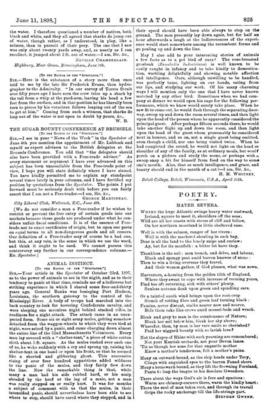ANIMAL INSTINCT.
[To nu EDITOR Or TH2 "SPECTATOR."] SIR,—Your article in the Spectator of October 23rd, 1897, as to the power of animals to see in the night, and as to their tendency to panic at that time, reminds me of a ludicrous but striking experience in which I shared some four-and-thirty years ago. General Banks was besieging Port Hudson, Louisiana, the southern gateway to the control of the Mississippi River. A body of troops had marched into the back country to look for hovering Confederate cavalry, and were sleeping one moonless night behind stacked rifles, in readiness for a night attack. The attack came in an unex- pected form. Some six or eight army mules, getting somehow detached from the waggon-wheels to which they were tied at night, were seized by a panic, and came charging down almost the entire line of the 52nd Massachusetts Volunteers. Every man lay covered with a "shelter-tent," a piece of white cotton cloth about 5 ft. square. As the mules rushed over each one of us, he woke suddenly with a cry and sprang up, raising his shelter-tent in one hand or upon his front, so that he seemed like a sheeted and gibbering ghost. This successive rising of over four hundred apparitions added wildness to the panic of the mules, and they fairly flew down the line. Now the remarkable thing is that, while many a man had his aide rubbed hard, or his scalp abraded by the hoof or the leg of a mule, not a man was really stepped ma or really hurt. It was for months a subject of comment with us that the mules, in their intensified panic, should nevertheless have been able to see where to step, should have cared where they stepped, and in their speed should have been able always to step on the ground. The men presently lay down again, but for half an hour afterwards a laugh at the ludicrousness of the experi- ence would start somewhere among the recumbent forms and go pealing up and down the line.
May I also add to your interesting stories of animals a few facts as to a pet bird of ours ? The rose-breasted grosbeak (Zamelodia ludoviciana) is well known to be easily caught in infancy and to take kindly to domestica- tion, warbling delightfully and showing notable affection and intelligence. Ours, although unwilling to be handled, was perfectly tame, lighting on our hands, eating from our lips, and studying our work. Of his many charming ways I will mention only the one that I have never known matched by any other bird. Sometimes when we had com- pany at dinner we would open his cage for the following per- formance, which we knew would surely take place. When he saw fit to come out, he would flash through the separating door- way, sweep up and down the room several times, and then light upon the head of the person whom he apparently considered the principal guest. After perhaps fifteen seconds there, he would take another flight up and down the room, and then light upon the head of the guest whom presumably he considered next in honour, and so on, not a single guest being omitted, even though a child, nor one being visited twice. When he had completed the round, he would not light on the head or shoulder of any of the family, as at ordinary meals, but woulf perch on a picture and study the scene, or perhaps with swoop snap a bit for himself from food on the way to some one's mouth. Alas, that so much intelligence, and grace, and beauty should end in the mouth of a cat !—I am, Sir, &c.,






































 Previous page
Previous page